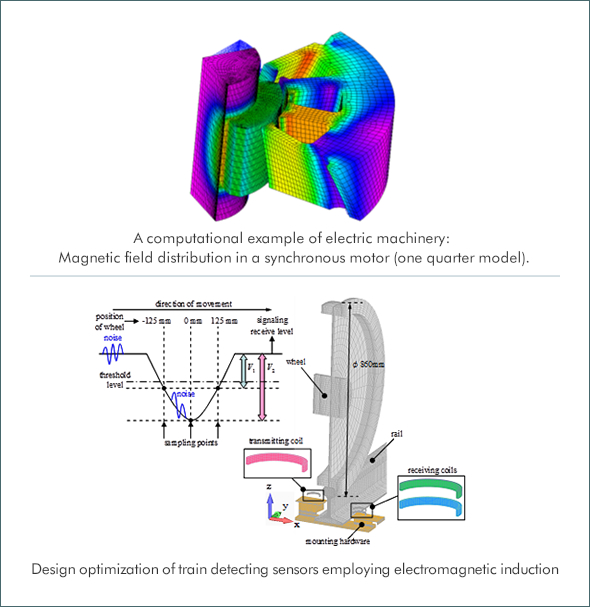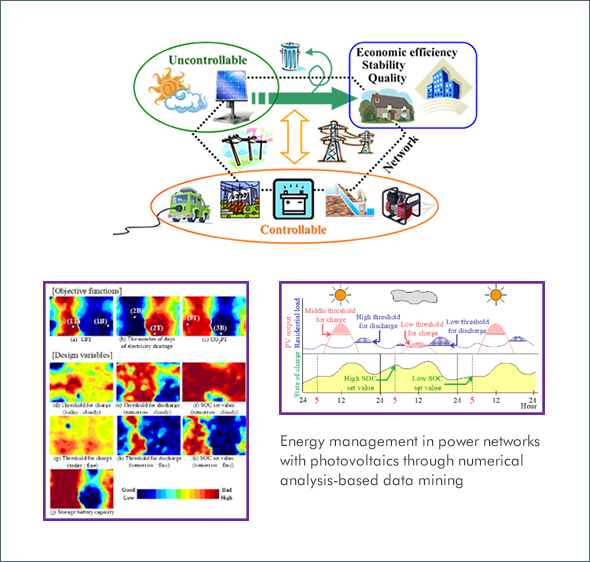Research Background
The technologies developed following the Industrial Revolution were generally based on the large-scale consumption of fossil fuels, a finite resource. This has led to a growing emphasis, especially in recent years, on the development of alternative energy sources and on improving energy conversion efficiency. Continuing economic growth based on fossil fuel consumption and fossil fuel-based energy generation will undoubtedly create dire conditions in the future, including a divergence between the energy needed and the amount of energy available for use: the so-called “energy gap.” Moreover, damage from abnormal weather patterns, including global warming generated by CO2 emissions, has already emerged as a clear byproduct of mass fossil fuel consumption.
The issue of energy and the environment poses an exceedingly complex problem for modern society—one not likely to be solved by a single approach. In some ways, the problem of energy and the environment is similar to the sport of Japanese judo, where one can achieve victory by accumulating points to win by decision rather than by achieving an ippon (“knockout”) victory. As we will never be able to solve the problem of energy and the environment as an ippon victory, it is important that we find as many ways to accumulate such points as possible across various technical fields. A single isolated effort may be insufficient, but the combination of many such efforts may just prove significant.
Against this backdrop, we are currently pursuing technical developments both to improve energy use efficiency and to expand the practical applications of renewable energy to help create a low carbon society. In principle, any field based on electromagnetic energy is a potential research target. Our research is characterized by large-scale computational analysis of physical phenomena, including various numerical techniques and novel modeling methodologies—key techniques that distinguish the approach taken by our laboratory.

Research Keywords
- Large-scale multiphysics computations
- Design optimization
- Electromagnetic field analysis
- Highly-efficient energy conversion
- Photovoltaic power generation systems
- Energy management
- Energy storage
Research Themes
Currently, we conduct research broadly divided into two themes
Technology development to limit energy consumption and environmental burden by improving energy use efficiency
- Design of railway wheel detector insusceptible to electromagnetic noise, Otake, A., Takayasu, K., Wakao, S., IEEE Transaction on Magnetics, 46, 8, p. 2731-2734 (2010)
- Orthogonalized infinite edge element method -convergence improvement by orthogonalization of hilbert matrix in infinite edge element method, Tamitani, S., Tsuzaki, K., Wakao, S., et al., IEEE Transactions on Magnetics, 48, 2, p. 363-366 (2012)
- Design Optimization of Primary Core in Induction Heating Roll by the Combination of 2D Level-set Method and 3D Coupled Magnetic-Thermal FEM, Hirono, K., Hoshino, R., Kamiya, T., Wakao, S., et al., IEEJ Journal of Industry Applications, 7, 1, p. 64-72 (2018)

Development of utilization technology for renewable energy to realize a low carbon society
- Multi-objective optimization of storage battery operation in clustered residential grid-interconnected PV, Kinoshita, S., Shimoo, T., Wakao, S., Miyamoto, Y., 17th PSCC - 17th Power Systems Computation Conference (2011)
- Effect of PV output and load power forecast error on operation design of PV system with storage battery, Hayashi, T., Shimoo, T., Wakao, S., Electrical Engineering in Japan, 190, 1, p. 28-36 (2015)
- Estimation Prediction Interval of Solar Irradiance Based on Just-in-Time Modeling for Photovoltaic Output Prediction, Yamazaki, T., Homma, H., Wakao, S., et al., Electrical Engineering in Japan, 195, 3, p. 1-10 (2016)

